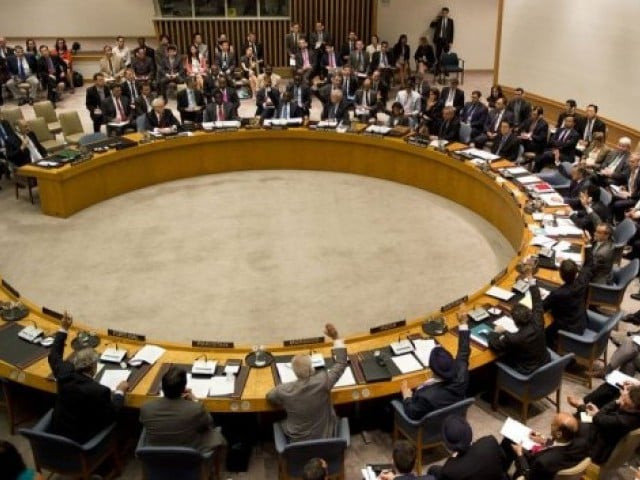India does not qualify for permanent UNSC membership: FO
Foreign Office says new permanent member seat could make Security Council even more undemocratic

PHOTO: AFP
Pakistan has always advocated effective and feasible reforms of the UNSC and its working methods on the basis of consensus among UN members, Foreign Office Spokesperson Tasnim Aslam said at weekly news briefing.
“UNSC reforms should make this vital organ for peace and security more democratic, effective and responsive to the aspirations of the member states. A reformed UNSC should reflect interests of wider membership of the UN,” she said.
She warned that the idea of new permanent member seats in the UNSC will only create new centers of power and privileges, and could make the Security Council even more undemocratic.
Responding to questions about the recent US-India defense pact, the spokesperson said the pact can only add to the conventional asymmetry and undermine the regional stability.
She voiced concerns over India's massive acquisition of conventional weapons.
“This will further complicate stability in the region,” she said.
“India has increased its defense spending by 12% in 2014-15. Its defense budget stands at 38.3 billion dollars, and for the last three years India has been a top buyer of conventional weapons,” the spokesperson said.
To a question, Tasnim Aslam said “China is a global power and is significantly contributing to regional stability,” Aslam said in response to a question.
She said the Chinese president’s visit will take place, but the dates have not yet been finalised.
“Pakistan is determined to work with the US to expand bilateral relations on the basis of mutual respect and interests,” Aslam said in regard to relations with the United States
“Washington is our major trading partner and a big investor in Pakistan. A new round of strategic dialogue commenced this month. We have five working groups covering the wide spectrum of bilateral relations, and a sixth working group is being established on education,” the spokesperson added.
Regarding counter-terrorism operations, the spokesperson said Pakistan is pursuing a comprehensive strategy to deal with the menace.
The international community should also devise a strategy for elimination of terrorism, she said.
To a question, Tasnim Aslam said “China is a global power and is significantly contributing to regional stability,” Aslam said in response to a question.
She said the Chinese president’s visit will take place, but the dates have not yet been finalised.
“Pakistan is determined to work with the US to expand bilateral relations on the basis of mutual respect and interests,” Aslam said in regard to relations with the United States
“Washington is our major trading partner and a big investor in Pakistan. A new round of strategic dialogue commenced this month. We have five working groups covering the wide spectrum of bilateral relations, and a sixth working group is being established on education,” the spokesperson added.
Regarding counter-terrorism operations, the spokesperson said Pakistan is pursuing a comprehensive strategy to deal with the menace.
The international community should also devise a strategy for elimination of terrorism, she said.



















COMMENTS
Comments are moderated and generally will be posted if they are on-topic and not abusive.
For more information, please see our Comments FAQ